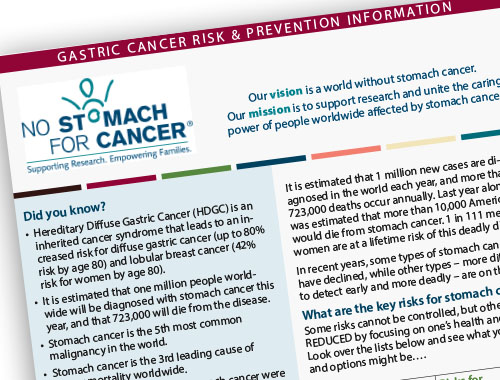Some of the factors that may increase the risk for the development of gastric cancer include age, gender, ethnicity, smoking, family history, diet, and H. Pylori.
H. pylori is a common, treatable infection that can lead to stomach inflammation and may increase the risk of developing gastric cancer.
In the United States, gastric cancer is more common in American Indians, Alaska Natives, Asians, Hispanic Americans, and African Americans than in non-Hispanic whites.
American Society of Clinical Oncology Stomach Cancer Risk Factors
Advocate for Yourself
Remember to advocate for yourself and be persistent if you have symptoms that don’t go away. If you feel that something isn’t right and you are not getting the answers you need, don’t give up pursuing a diagnosis. Continue to seek answers, and don’t stop until you get them. Go with your gut!
Meilin Keen was diagnosed with stomach cancer at 26. She’s part of a growing demographic of people who are getting cancer diagnoses before the age of 50. And doctors don’t know why. Wall Street Journal’s Brianna Abbott explains what we know so far.
Risks for Stomach Cancer
Some risks cannot be controlled, but others can be REDUCED by focusing on one’s health and choices. Review these lists and see what your risks might be.
Behavioral/Lifestyle Risks
- Alcohol and Tobacco use
- Obesity
- Diets rich in smoked, salted, and pickled foods
- Diets low in fresh fruits and vegetables
- Environmental exposure to dust and fumes
Demographics/Family History
- Stomach Cancer and Asian Americans
- Stomach Cancer and Black/African Americans
- Stomach Cancer and Hispanic/Latino Americans
- Stomach Cancer and American Indians/Alaska Natives
- Stomach Cancer and Native Hawaiians/Pacific Islanders
Other Risk Factors
- Aged 50 and over
- Male gender
- Having blood type A
- Long-term inflammation of the stomach (Gastritis)
- Helicobacter pylori (H. pylori) bacterial infection
- Megaloblastic (pernicious) anemia
- History of stomach polyps or stomach lymphoma
- Race (more common in Asians, Pacific Islanders, Hispanics, and African Americans than in non-Hispanic Caucasian Americans)
- Ménétrier’s Disease
- Autoimmune Atrophic Gastritis
Genetic Risks for Stomach Cancer
- A family history of familial adenomatous polyposis or BRCA1 or BRCA2 mutations
- A family history of Stomach Cancer (inherited diseases)
- CDH1 Gene Mutation
- CTNNA1 Gene Mutation
- ATM Gene Mutation
- KIT Gene Mutation
- PDGFRA Gene Mutation
- Lynch Syndrome, also known as hereditary non-polyposis colorectal cancer (HNPCC). Changes in the MLH1, MSH2, MSH6, PMS2, or EPCAM gene.
Share the Risk & Prevention Flyer with family members with these risk factors.

Preventing Stomach Cancer
- Early detection is the key to surviving stomach cancer.
- Lifestyle changes, such as smoking cessation and eating a diet rich in fruits and vegetables, can potentially reduce the risk of stomach cancer.
- Treatment of H. pylori infection (a common bacterial infection of the stomach) can decrease the risk of stomach cancer development.
- Knowing your family history and discussing it with your healthcare provider can help determine if you are at risk for inherited cancer syndromes. If you have a family history of stomach cancer or lobular breast cancer, you can perform your Genetic Counseling and Genetic Testing from the comfort of your home by clicking here to connect with our partners at Emory University
Screening
Screening means testing seemingly healthy people, those who have no symptoms, for early-stage cancer. The ability to screen for any cancer requires an accurate and reliable test to use, one that will identify tumors that are there. It must not give a positive result in people who do not have cancer.
In countries such as Japan, where stomach cancer is prevalent, mass screening of the population has helped in detecting cancers at an early, curable stage. Testing involves barium swallow X-rays and endoscopy screening. This may have reduced the number of people who die of this disease, but this has not been proven. It is still not clear whether the screening reduces the number of people who eventually develop advanced stomach cancer.
Presently, there are no effective screening methods for stomach cancer or programs focused on prevention or early detection in the United States. The same holds for Canada and the United Kingdom.
Studies in the United States have not found routine screening to be helpful for those at average risk for stomach cancer because the disease is not as common. However, people with certain stomach cancer risk factors may benefit from screening.
For patients and families with clinical features suggestive of Hereditary Diffuse Gastric Cancer (HDGC), but without a germline CDH1 mutation, intensive endoscopic surveillance in an expert center for first-degree relatives of patients meeting the criteria for HDGC is advised. This is also the case for patients and families with a CDH1 variant of uncertain significance. Standardized endoscopic surveillance in experienced centers is recommended for those who have a CDH1 mutation but have opted not to undergo total gastrectomy at present. Learn more about HDGC in Families.
Know your family history
Review and update your family history regularly with your primary care provider to determine if genetic counseling is appropriate.
